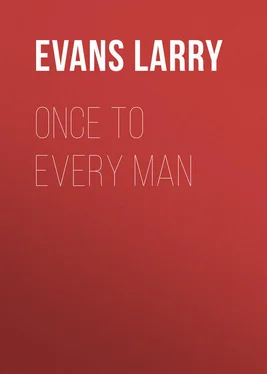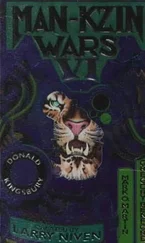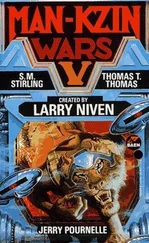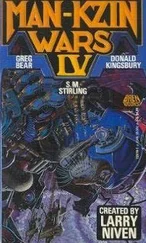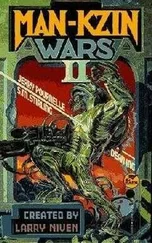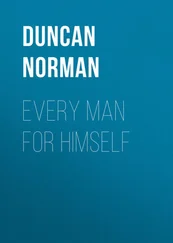Larry Evans - Once to Every Man
Здесь есть возможность читать онлайн «Larry Evans - Once to Every Man» — ознакомительный отрывок электронной книги совершенно бесплатно, а после прочтения отрывка купить полную версию. В некоторых случаях можно слушать аудио, скачать через торрент в формате fb2 и присутствует краткое содержание. Жанр: foreign_antique, foreign_prose, foreign_sf, на английском языке. Описание произведения, (предисловие) а так же отзывы посетителей доступны на портале библиотеки ЛибКат.
- Название:Once to Every Man
- Автор:
- Жанр:
- Год:неизвестен
- ISBN:нет данных
- Рейтинг книги:5 / 5. Голосов: 1
-
Избранное:Добавить в избранное
- Отзывы:
-
Ваша оценка:
- 100
- 1
- 2
- 3
- 4
- 5
Once to Every Man: краткое содержание, описание и аннотация
Предлагаем к чтению аннотацию, описание, краткое содержание или предисловие (зависит от того, что написал сам автор книги «Once to Every Man»). Если вы не нашли необходимую информацию о книге — напишите в комментариях, мы постараемся отыскать её.
Once to Every Man — читать онлайн ознакомительный отрывок
Ниже представлен текст книги, разбитый по страницам. Система сохранения места последней прочитанной страницы, позволяет с удобством читать онлайн бесплатно книгу «Once to Every Man», без необходимости каждый раз заново искать на чём Вы остановились. Поставьте закладку, и сможете в любой момент перейти на страницу, на которой закончили чтение.
Интервал:
Закладка:
Denny Bolton cleared his throat and shuffled his feet uneasily, but this hint for haste was utterly wasted upon Old Jerry. The latter failed completely to note the strained intensity of the face that was upturned before him and went on grumbling as he leaned over to fumble in the box beneath the seat. And the tirade continued in an unbroken, half-muffled stream until he straightened laboriously again, the boy’s usual weekly packet of papers and catalogues in one hand.
“No,” he emphasized deliberately, “I wouldn’t really go so fur’s that–I ain’t figgerin’ on makin’ no complaint–not this time. I got too much regard for the Judge to try to get him into any hot water. But there wa’n’t no real use nor reason in his postin’ all them invitations to once. He could a-begun back a stretch and kinda run ’em in easy, a little to a time, instead of lumpin’ ’em this way, and that would a-give me–”
Young Denny reached out and took the bundle from the extended, unsteady old hand. His own hands were shaking a little as he broke the string and fluttered swiftly through the half dozen papers and pamphlets. Old Jerry never skipped a breath at the interruption.
“But that finishes up the day–that’s about the last of it.” The thin voice became heavily tinged with pride. “There ain’t nobody in the township but what’s got his card to that barn-raising by now–delivered right on the nail! That’s my system.” And then, judiciously: “I guess it’s a-goin’ to be a real fancy affair, too, at that. Must be it’ll cost him more’n a little mite before he gits done feedin’ ’em. They was a powerful lot of them invitations.”
Slowly Denny Bolton’s head lifted. He stood and stared into Old Jerry’s peaked, wrinkled face as if he had only half heard the rambling complaint, a strange, bewildered light growing in his eyes. Then his gaze dropped once more, and a second time, far more slowly, his fingers went through the packet of advertisements. Old Jerry was leaning over to unwind the reins from the whipstock when the boy’s hand reached out and stopped him.
“Ain’t there–wasn’t there anything more for me–tonight?” Young Denny inquired gravely.
Jerry paused impatiently. No other question ever caused him quite such keen irritation, for he felt that it was a slur at his reliability.
“More!” he petulantly echoed the question. “More? Why, you got your paper, ain’t you? Was you expectin’ sunthin’ else? Wasn’t looking for a letter, now was you?”
Denny backed slowly away from the wheel. Dumbly he stood and licked his lips. He cleared his throat again and swallowed hard before he answered.
“No,” he faltered at last, with the same level gravity. “No, I wasn’t exactly expectin’ a letter. But I kind of thought–I–I was just hopin’–”
His grave voice trailed heavily off into silence. Eyes still numbly bewildered he turned, leaning forward a little, to gaze out across the valley at the great square silhouette of Judge Maynard’s house on the opposite ridge, while Old Jerry wheeled the protesting buggy and started deliberately down the hill. Just once more the latter paused; he drew the fat gray mare to a standstill and leaned a last time far out from the seat.
“A-course I didn’t mean nothin’ when I spoke about complainin’ against the Judge,” he called back. “You know that, don’t you, Denny? You know I was just jokin’, don’t you?” A vaguely worried, appealing strain crept into the cracked accents. “An’ a-course you wouldn’t say nothin’ about my speakin’ like that. I think a whole heap too much of the Judge to even try to git him into trouble–and–and then the Judge–he might–you understand that I was only jokin’, don’t you, Denny?”
Young Denny nodded his head silently in reply. Long after the shrill falsetto grumbling had ceased to drift back up the hill to him he stood there motionless. After a while the fingers that still clutched the bundle of circulars opened loosely and when he did finally wheel to cross slowly to the kitchen door the papers and catalogues lay unheeded, scattered on the ground where they had fallen.
He stopped once at the threshold to prop his pike-pole against the house corner before he passed aimlessly inside, leaving the door wide open behind him. And he stood a long time in the middle of the dark room, staring dully at the cold, fireless stove. Never before had he given it more than a passing thought–he had accepted it silently as he accepted all other conditions over which he had no control–but now as he stood and stared, it came over him, bit by bit, that he was tired–so utterly weary that the task of cooking his own supper that night had suddenly become a task greater than he could even attempt. The very thought of the half-cooked food sickened him–nauseated him. Motionless there in the dark he dragged one big hand across his dry lips and slowly shook his head.
“They didn’t want me,” he muttered hoarsely. “It wasn’t because they forgot me before; they didn’t want me–not even for the strength of my shoulders.”
With heavy, shuffling steps he crossed and dropped loosely into a chair beside the bare board table that stood in front of one dingy window. A long time he sat silent, his lean chin propped in his rough palms, eyes burning straight ahead of him into vacancy. Then, little by little, his great shoulders in the vividly checkered coat began to sag–they slumped downward-until his head was bowed and his face lay hidden in the long arms crooked limply asprawl across the table-top.
Once more he spoke aloud, hours later.
“They didn’t want me,” he repeated dully. “Not even for the work I could do!”
CHAPTER III
It was very quiet in the front room of the little cottage that squatted in the black shadow below Judge Maynard’s huge house on the hill. No sound broke the heavy silence save the staccato clip-clip of the long shears in the fingers of the girl who was leaning almost breathlessly over the work spread out on the table beneath the feeble glow of the single oil-lamp, unless the faint, monotonous murmur which came in an endless sing-song from the lips of the stooped, white-haired old figure in the small back room beyond the door could be named anything so definite.
John Anderson’s lips always moved when he worked. His fingers, strong and clean-jointed and almost womanishly smooth–the only part of the man not pitifully seared with age–flew with a bewildering nimbleness one moment, only to dwell the next with a lingering caress upon the shaping features before him; and for each caress of his finger tips there was an accompanying, vacantly gentle smile or an uncertainly emphatic nod of the silvered head which gave the one-sided conversation a touch of uncanny reality.
And yet, at regularly recurring intervals, even his busy fingers faltered, while he sat head bent far over to one side as though he were listening for something, waiting for some reply. At every such pause the vacant smile left his face and failed to return immediately. The monotonously inflectionless conversation was still, too, for the time, and he merely sat and stared perplexedly about him, around the small workshop, bare except for the single high-stool that held him and the littered bench on which he leaned.
There was a foot-wide shelf against each wall of that room, fastened waist high from the floor, and upon it stood countless small white statues, all slim and frail of limb, all upturned and smiling of lip. They were miraculously alike, these delicate white figures, each with a throat-tightening heartache in its wistful face–so alike in form and expression that they might have been cast in a single mold. Wherever his eyes might fall, whenever he turned in one of those endlessly repeated fits of faltering uncertainty, that tiny face was always before him, uplifted of lip, smiling back into John Anderson’s vacant eyes until his own lips began to curve again and he turned once more, nodding his head and murmuring contentedly, to the clay upon his bench.
Читать дальшеИнтервал:
Закладка:
Похожие книги на «Once to Every Man»
Представляем Вашему вниманию похожие книги на «Once to Every Man» списком для выбора. Мы отобрали схожую по названию и смыслу литературу в надежде предоставить читателям больше вариантов отыскать новые, интересные, ещё непрочитанные произведения.
Обсуждение, отзывы о книге «Once to Every Man» и просто собственные мнения читателей. Оставьте ваши комментарии, напишите, что Вы думаете о произведении, его смысле или главных героях. Укажите что конкретно понравилось, а что нет, и почему Вы так считаете.
